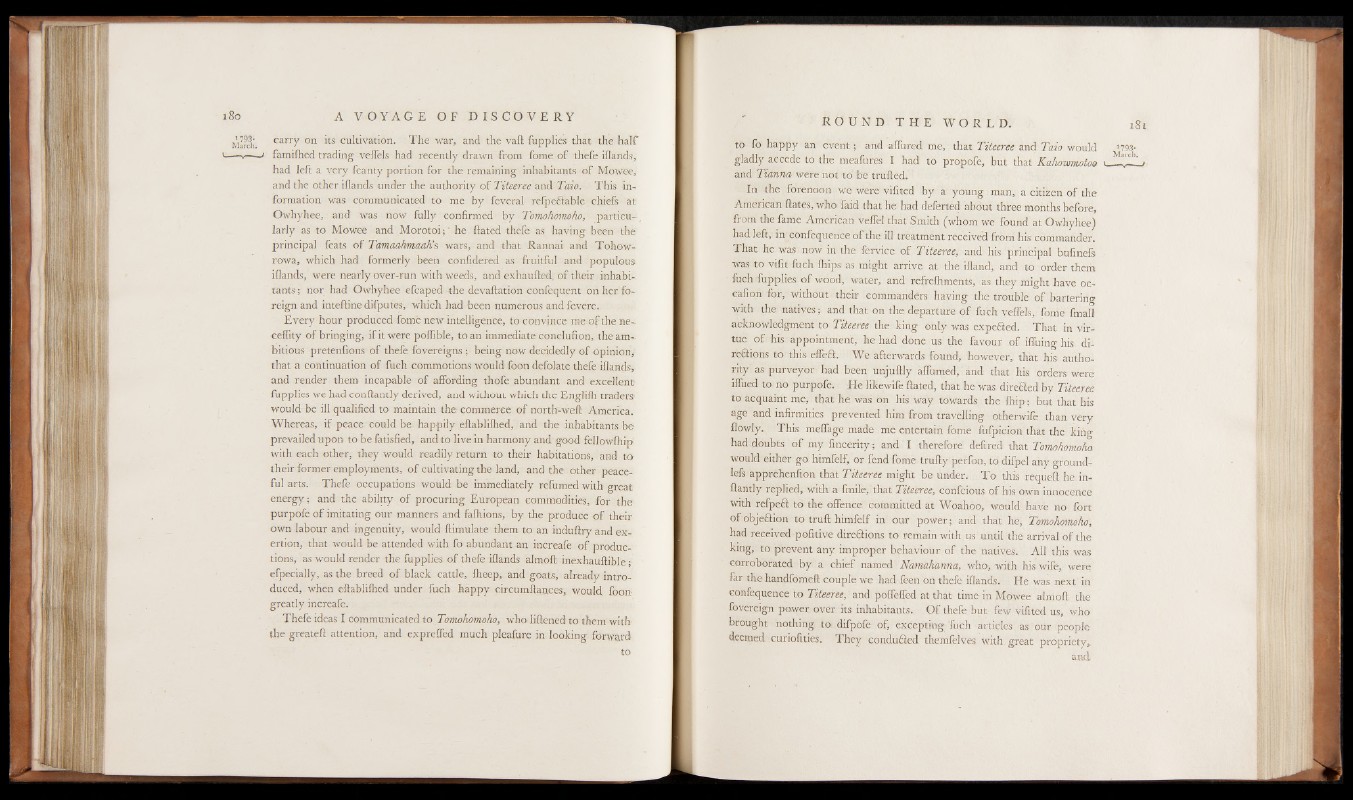
March carry °n its cultivation. The war, and the vaft fupplies that the half
— v— J famifhed trading veflels had recently drawn from fonre of thefe iflands,
had left a very fcanty portion for the remaining inhabitants of Mowee,
and the other iflands under the authority of Titeeree and Taio. This information
was communicated to me by feveral refpeflable chiefs at
Owhyhee,. and was now fully confirmed by Tomohomoho, particu-,
larly as to Mowee and Morotoi; ' he ftated thefe as having been the
principal feats o f Tamaahmaah’s wars, and that Rannai and Tohow-
rowa, which had formerly been confidered as fruitful and populous
iflands, were nearly over-run with weeds, and exhaufted. of their inhabitants;
nor had Owhyhee efcaped the devaftation confequent on her. foreign
and inteftine difputes, which had been numerous and fevere..
Every hour produced fome new intelligence, to convince me of the ne-
ceffity of bringing, if it were poffible, to an immediate conclufion, the ambitious
pretenfions of thefe fovereigns ; being now decidedly of opinion,
that a continuation of fuch commotions would foon defolate thefe iflands,
and render them incapable of affording thofe abundant and excellent
fupplies we had conflantly derived, and without which the Englifh traders
woulchbe ill qualified to maintain the commerce of north-weft America.
Whereas, if peace could be happily eftablifhed, and the inhabitants bo
prevailed upon to be fatisfied, and to live in harmony and good fellowlhip
with each other, they would readily return to their habitations, and to
their former employments, o f cultivating the land, and the other peaceful
arts. Thefe occupations would be immediately refumed with great
energy; and the ability of procuring European commodities, for the
purpofe of imitating our manners and fafhions, by the produce of their
own labour and ingenuity, would ftimulate them to an induftry and exertion,
that would be attended with fo abundant an increafe o f productions,
as would render the fupplies of thefe iflands almoft inexhauftible •
efpecially, as the breed o f black cattle, fheep, and goats, already introduced,
when eftablifhed under fuch happy circumftances, would foon
greatly increafe.
Thefe ideas I communicated to Tomohomoho, who liftened to them with
the greateft attention, and expreffed much pleafure in looking forward
to
to fo happy an event; and aflured me, that Titeeree and Taio would
gladly accede to the meafures I had to propofe, but that Kahowmotoo
and Tianna were not to be trufted.
In the forenoon we were vifited by a young man, a citizen o f the
American ftates, who laid that he had deferted about three months before,
from the fame American veflel that Smith (whom we found at Owhyhee)
had left, in confequence o f the ill treatment received from his commander.
That he was now in the fervice o f Titeeree, and his principal bufinefs
was to vifit fuch {hips as might arrive at the ifland, and to order them
fuch fupplies of wood, water, and refrefhments, as they might have oc-
cafion for, without their commanders having the trouble of bartering
with the natives; and that on the departure o f fuch veflels, Tome final!
acknowledgment to Titeeree the king only was expefted. That in virtue
of his appointment, he had done us the favour o f iffuing his di-
reftions to this effeft. We afterwards found, however, that his authority
as purveyor had been unjuftly aflumed, and that his orders were
iflued to no purpofe. He likewife ftated, that he was direSedhy Titeeree
to acquaint me, that he was on his way towards the {hip; but that his
age and infirmities prevented him from travelling otherwife than very
flowly. This meflage made me entertain fome fufpicion that the king
had doubts o f my fincerity; and I therefore defired that Tomohomoho
would either go himfelf, or fend fome trufty perfon, to difpel any ground-
lefs apprehenfion that Titeeree might be under. T o this requeft he in-
ftantly replied, with a fmile,'that Titeeree, confcious of his own innocence
with refpeft to the offence committed at Woahoo, would have no fort
of obje&ion to truft himfelf in our power; and that he, Tomohomoho,
had received-pofitive direftions to remain with us until the arrival of the
king, to prevent any improper behaviour of the natives. All this was
corroborated by a chief named Namahanna, who, with his wife, were
far the handfomeft couple we had feen on thefe iflands. He was next in
confequence to Titeeree, and poflefled at that time in Mowee almoft the
fovereign power over its inhabitants... O f thefe but few vifited us, who
brought nothing to difpofe of, excepting fuch articles as our people
deemed curiofities. They conducted themfelves with. great propriety,
and